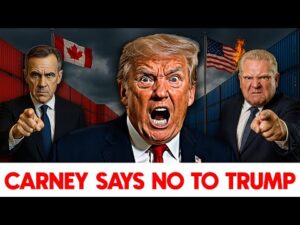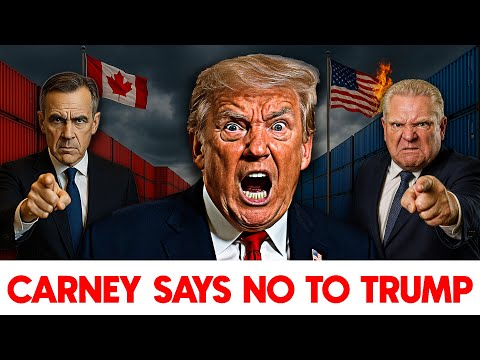
Donald Trump’s aggressive trade tactics often painted a picture of American dominance. But a recent high-stakes confrontation with Canada, and specifically then-Governor of the Bank of Canada, Mark Carney, revealed a different reality: a struggling American economy vulnerable to strategic countermeasures. This clash, marked by Trump’s escalating tariff threats, ultimately exposed the hollowness of his perceived leverage and highlighted Canada’s surprising resilience.
**The Tariff Tempest: Trump’s Aggressive Gamble**
Trump’s administration launched a series of aggressive tariff threats against Canada, aiming to force concessions on issues ranging from foreign policy to the recognition of a Palestinian state. The stated goal was to reshape the trade landscape in America’s favor, leveraging its economic clout to achieve political objectives. This approach, however, underestimated Canada’s preparedness and the potential ramifications for the already fragile American economy. The escalating tensions painted a dramatic picture of a trade war on the brink, with the potential for significant global economic repercussions.
**Carney’s Calculated Resistance: A Masterclass in Strategic Defense**
Instead of succumbing to pressure, Mark Carney, then Governor of the Bank of Canada, expertly turned the tables. He refused to bow to Trump’s demands, demonstrating a steadfast commitment to Canadian national interests. This wasn’t simply stubbornness; it was a calculated strategy rooted in a deep understanding of the economic landscape. Canada, unlike many other nations, had proactively diversified its trade relationships and implemented robust economic protections. This strategic foresight proved crucial in mitigating the impact of Trump’s tariffs.
**The Crumbling Foundation: America’s Economic Weakness**
The situation highlighted a stark reality: while Trump projected an image of American economic invincibility, the reality was far more nuanced. The American economy, already facing headwinds, suffered the loss of over 250,000 jobs as key industries faltered under the weight of the trade conflict. Trump’s aggressive tactics, intended to cripple the Canadian economy, instead exposed the fragility of the American system. The reliance on a confrontational trade approach backfired spectacularly, revealing a lack of preparedness for a prolonged trade war.
**Canada’s Resilience: Diversification and Economic Strength**
In contrast to America’s struggles, Canada demonstrated remarkable resilience. Its preemptive strategies, including trade diversification and economic safeguards, significantly lessened the blow of Trump’s tariffs. This strategic planning, often overlooked in discussions of international trade, proved to be a critical buffer against economic instability. The contrast between the two nations highlighted the importance of long-term economic planning and the risks of relying solely on short-term, aggressive tactics.
**The Unseen Balance of Power: A Shifting Global Landscape**
The U.S.-Canada trade standoff served as a crucial turning point, revealing a shift in the balance of global economic power. Trump’s initial assumption of American dominance was challenged by Canada’s strategic response. Carney’s actions exposed the limitations of brute-force trade tactics and demonstrated the effectiveness of well-planned economic diversification and defensive strategies. The episode serves as a cautionary tale, highlighting the importance of careful consideration of economic interdependence and the potential consequences of aggressive trade policies.
**Conclusion: Lessons Learned from a Trade War Averted**
The confrontation between Trump and Carney offers valuable lessons. It demonstrates that economic strength isn’t solely measured by size, but also by resilience, adaptability, and strategic foresight. While Trump’s aggressive approach initially seemed formidable, Canada’s calculated response ultimately exposed the vulnerabilities of the American economy and highlighted the need for a more nuanced approach to international trade. This clash serves as a stark reminder that trade wars are rarely won, and often inflict considerable damage on all participants.
